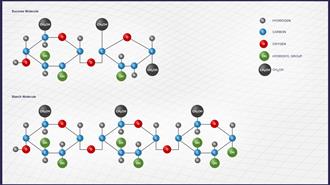Carbohydrates
Carbohydrates in their natural unrefined state are an important source of energy and nutrition. Carbohydrates on average should provide the body with 50-60 per cent of its calorific intake (approx. 250g for women and 310g for men depending on lifestyle).
Carbohydrates are metabolized into the blood glucose to become the body’s primary source of energy and exist in our diet in two forms – simple and complex.The simple forms of carbohydrates are the sugars, which are generally present as single units called monosaccharides. These include glucose, fructose and maltose. Disaccharides are also simple sugars and are formed when monosaccharide’s combine in pairs.The most well-known disaccharide is sucrose (table sugar). It is formed by the condensation of glucose and fructose.
Simple or refined sugars offer calorific energy and nothing else in the way of nutrition – they are empty calories. Because sugar is converted quickly into glucose to power the body, sugar rushes are swift and palpable. The downside is they get used up just as suddenly, resulting in an equally dramatic crash.
Complex carbohydrates contain many monosaccharide units (more than 10) arranged in straight or branched and coiled chains. Complex carbohydrates are found in whole grains, vegetables, pulses and fruit and exist as sugars that include starches and fibre as part of their molecular make up.
Complex carbohydrates provide a slower and more sustained release of energy than simple carbohydrates.In their natural form they contribute to long-term good health, appetite control and sustained energy levels.
Good sources of complex carbohydrates include oats, parsnips, sweet potatoes and bananas.
The diagram displays the disaccharide sucrose which is comprised of glucose and fructose monosaccarides. A starch molecule is also displayed showing it is made of many monosaccharide sub-units

